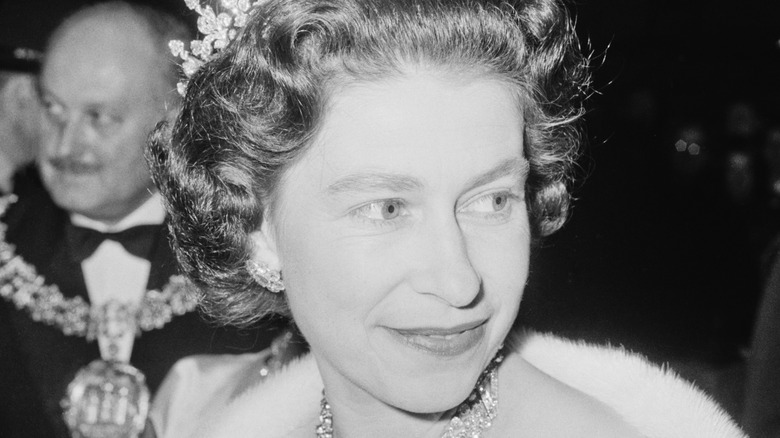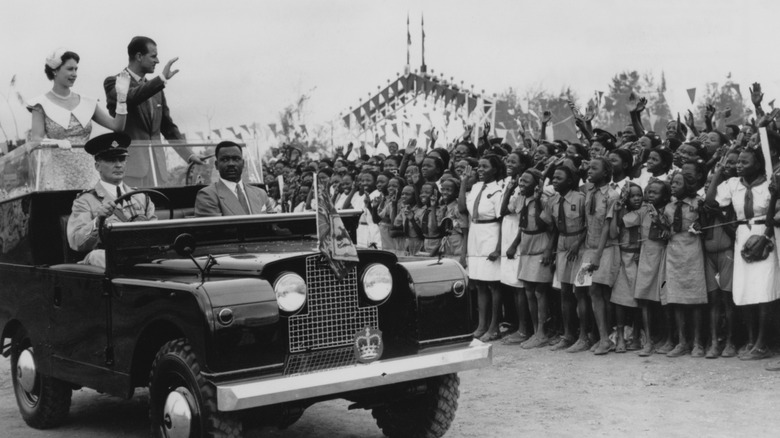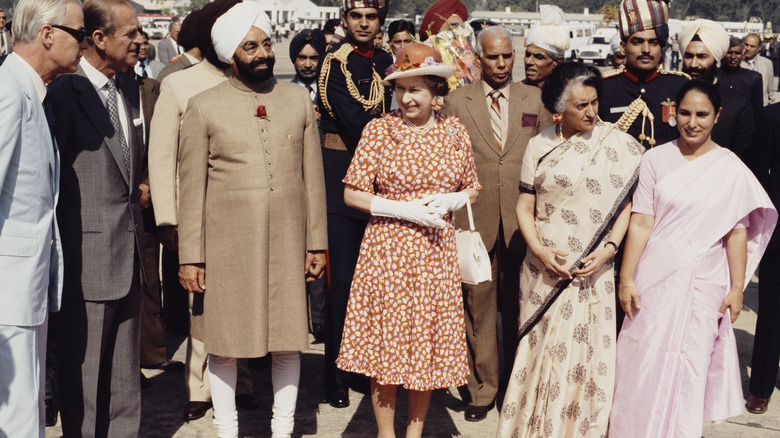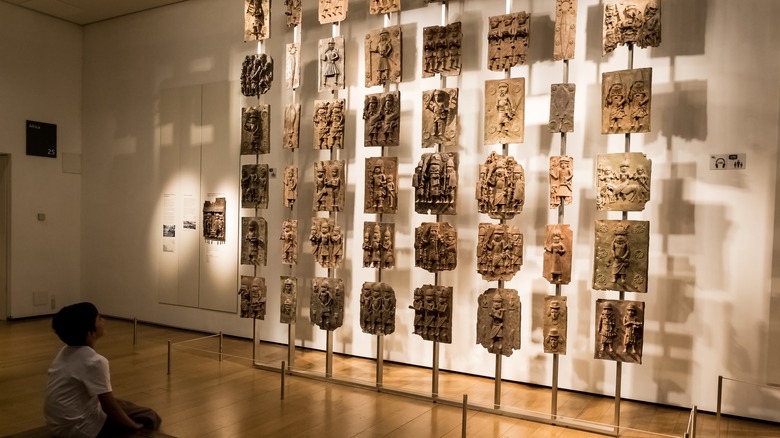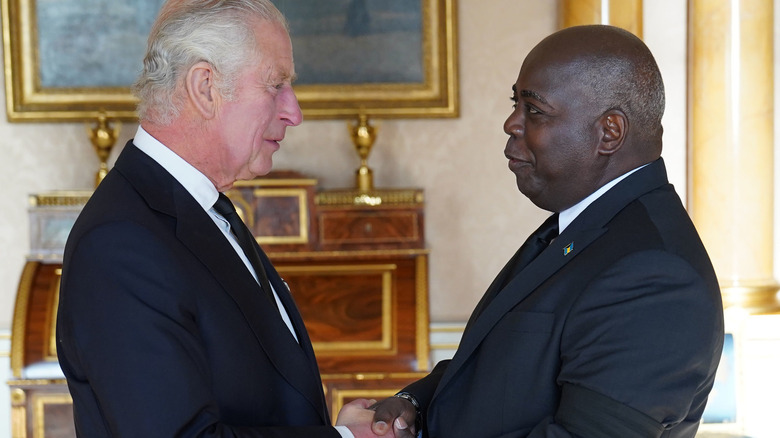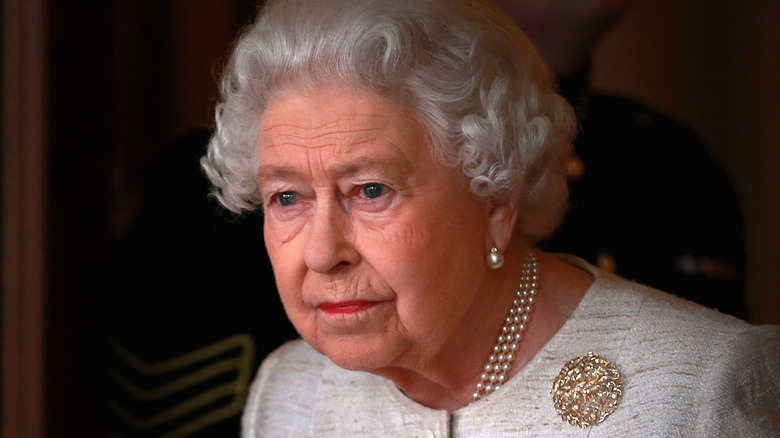Queen Elizabeth's Death Has People Reexamining A Darker Part Of Her Legacy
The death of Queen Elizabeth II, after 70 years spent on the English throne, brought forth an outpouring of grief and mourning in the U.K. and elsewhere. Thousands have lined-up in London for their chance to see the queen as she lays in state in Westminster Hall, based on The New York Times reporting. Those fond feelings for Queen Elizabeth, and for the British monarchy in general, were not shared by everyone, though, especially in former English colonies.
With the death of Queen Elizabeth, some have now called for a long-overdue reckoning with darker aspects of Elizabeth's reign and with the British royal family's legacy, as NBC News explains. In doing so, some call for financial recompense to those former colonies, and for the possible return of historic and cultural artifacts that are currently in English museums, among other forms of contrition, according to The Washington Post. This discussion also takes on new urgency as some countries seek their own independence from the English Commonwealth of Nations.
The British monarchy and some Africa nations share an especially troubling history
Many of England's former colonies are in Africa. Though some South African leaders paid tribute to the late queen, many in African nations like Kenya and Nigeria felt differently, as The Washington Post explains. The South African policy of apartheid, which only ended in that part of the world in the 1990s, was directly influenced by the British. In Kenya in particular, among other places, the British military violently put down uprisings prior to independence. That part of the world is still also deeply affected by the ripple effects of slavery, as NBC News also notes.
As a modern monarch in England, Elizabeth's duties in these parts of the world were largely ceremonial, but as one observer opined, while Elizabeth was in power, she could have done more to make amends for this troubling era in British history. Speaking with The Washington Post, Johannesburg writer Sipho Hlongwane said "The thing that I think Western people need to genuinely try to absorb and realize is that colonialism is history in the West ... It is a thing of the past, in the West. But in our countries, colonialism is now."
Elizabeth's legacy in South Asia is also complicated
Britain's colonial legacy was not limited to South Africa. The U.K. was also a colonial power in parts of South Asia such as India. One particularly troubling aspect of the British empire in that part of the world is the partitioning of India and Pakistan by the British empire in 1947 as Britain granted India independence and left the country (via the BBC). The new border between nations — decided upon arbitrarily, in the view of many — divided the population along religious and ethnic lines, creating social and economic hardships for generations.
Though some in this part of the world think fondly of the British, some say Britain's troubling history with enforcing colonialism tarnishes Elizabeth's legacy. Speaking with The Washington Post, Indian-born doctor Anuj Chandra, who now lives in the U.S., says that Queen Elizabeth conducted herself with grace and dignity in her lifetime. It's time, though, to question the British royal family's role at that tumultuous point in world history, Chandra added, and the part that they played in fostering white supremacy and racism.
Some call for historical artifacts and jewels to be returned to where they came from
Even before the queen's death, British museums had set about repatriating certain artifacts to the former colonies from where they were taken, such as a number of Nigerian artifacts stolen by the British in the 1890s. Those were returned to the country only about a month before the queen's death, as ABC News reports. At that time, the British military said in a statement: "The evidence is very clear that these objects were acquired through force, and external consultation supported our view that it is both moral and appropriate to return their ownership to Nigeria" (via ABC News).
Now that the queen has died, some call for even more ill-gotten artifacts in British museums to be returned to their home country. Even if they were ostensibly given away, such as the near-priceless Kohinoor diamond and the Great Star of Africa from India and South Africa respectively. The Great Star of Africa was cut, with the largest stone set into the royal scepter of the British Crown Jewels, per World History. The second largest cut adorns the Imperial State Crown which is used in British coronations.
The diamonds are part of the British Crown Jewels and are kept at the Tower of London. According to Newsweek, they are worth roughly $400 million each. Some are calling for the return of the Kohinoor diamond and the Great Star of Africa (also known as the Cullinan Diamond), to be returned to the nations where they were discovered.
Many commonwealth nations may now seek independence
At the time that King Charles III became king, he presided not just over the British Isles but also 14 commonwealth nations, all former colonies, such as Australia, Jamaica, New Zealand, and Antigua, among others in the Caribbean (via Bloomberg). As recently as 2021, Barbados — a former commonwealth nation and British colony — gained independence, replacing the queen with a president as head of state. Now that Queen Elizabeth has died, some speculate more commonwealth nations like Jamaica could follow suit.
As far as the Bahamas, a press secretary for Prime Minister Philip Davis (pictured above, with King Charles) said that a referendum to exit the commonwealth could be possible, but that there were no specific plans to pursue one in the immediate future. Speaking for the commonwealth nations of Antigua and Barbuda, though, Prime Minister Gaston Browne said to expect a referendum on independence from his country in as little as three years. In March 2022, Prince William, the new prince of Wales, said that any such referendum would be treated with respect.
Some in former colonies are able to separate the queen herself from the royal legacy
Though the death of Queen Elizabeth had brought up sharp criticism from former colonies and some commonwealth nations regarding the legacy of the British Empire, many are able to express admiration for the queen as a person separate from the darker side of royal history. As Matthew Smith, a history professor at the University College London and expert on British slave ownership told NBC News, when some people express critical views of the monarchy, "they're not thinking specifically about Queen Elizabeth."
As Smith went on to say, critics of the monarchy were thinking, instead, about the "institution and the relationship of the monarchy to systems of oppression." On that note, though, South-African writer Sipho Hlongwane also pointed out (via The Washington Post) "The choices she made, she could have made differently ... You can be born into that level of privilege and make choices that are different, then eat the consequences. Are we seriously not allowed to point that out?"
